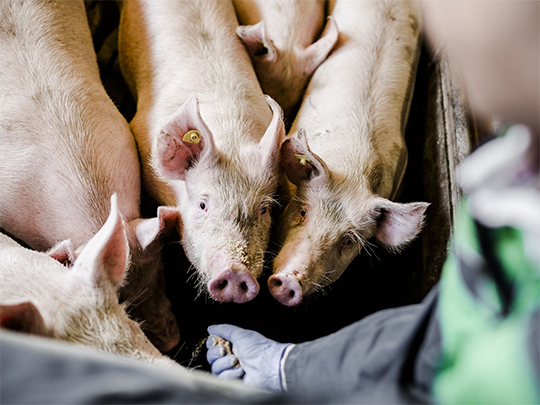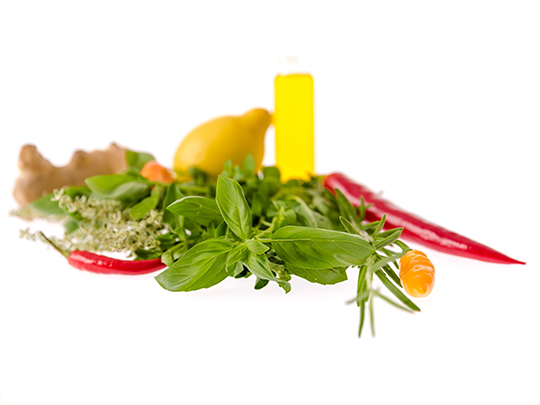In the spotlight: animal welfare & feeding - Part 2
After giving you first insights into the topic of how animal welfare and feeding go together, we will now highlight the role of a healthy, resilient gut and why phytogenic feed additives have the potential to be first choice, when it comes to optimal, species adapted feeding.

Healthy gut, strong immune defense, fit animal
At first glance, it seems clear. A sufficient feed and water supply is an essential requirement in animal husbandry and must be met to contribute to animal welfare.
However, looking closely, you will see that this aspect is much more than just satisfying the animals' hunger and thirst. Animal nutrition and animal health are closely related. Indeed, an incredible 70-80% of all immune cells are located in the digestive tract (2) — an organ in which immune reactions constantly occur. The intestine can be seen as an immunological training camp and a highly sophisticated defense system. In this context, the gut microbes play a critical role in the development of a robust and balanced immune system. (3,4)
Using suitable feed or feed additives tailored to the species' specific needs and considering their production stages can help optimize the microbiome, which in turn can result in a beneficial effect on the immune system. The so-called "belly brain" is strengthened and can thus contribute to better well-being.
The relevance of balance
In a healthy, resilient intestine, the defense cells are more likely to prevent bacteria, fungi, and other harmful microorganisms that enter the digestive tract with food from being absorbed by the organism. It is a miracle of resistance to diseases.
Every day, this essential protective barrier decides on friend and foe. To function smoothly, it is vital to keep the bacteria of the intestinal flora in the right balance.
Inadequate feed, environmental conditions - often connected to stress - and medication can impact this balance, meaning that the beneficial bacteria are pushed back, and the bad ones multiply to excess, leading to dysbiosis.
The consequences are well known: Undesired and even toxic metabolic products are formed and thus burden the intestine. As a result, foreign substances are no longer adequately blocked, and inflammatory processes may follow (5).
Did you know?
The "one and only" perfect intestinal flora does not exist. Each individuum has a unique composition of the intestinal microbiome. Though, the animal's diet, stage of digestion in the different intestinal compartments, the environment, genetics, and age of the host animal strongly influence it (6).
Eyes open when choosing feed additives
A wide variety of feeds and feed additives on the market enable specific use tailored to the animals' needs. Innovative active ingredients, such as phytogenics, and their synergistic combination can support feed intake, nutrient availability respectively, digestibility, and performance of the animals.
Not least, the targeted administration of feed additives can potentially support a healthy intestinal flora, strengthen resilience, and as a result reduce the undesirable excretion of nutrients and emissions.

"Beleaf" in phytogenics
As such, phytogenic (plant-based) feed additives (PFA) represent a crucial solution for livestock producers and companies developing antibiotic-free feeding programs. Phytogenic feed additives using plant extracts show great modes of action in animal nutrition due to the synergistic effects of all precious agents within a plant. This natural synergy, combined with sustainability, environmental protection, and increased animal welfare and safety, makes PFAs a top solution platform in multispecies animal nutrition.
Optimized feeding management and the targeted use of well-formulated feed additives such as PFAs set the pillar for successful animal production. It's evident that overall animal welfare plays an essential role in producing high-quality food right from the start. Nutrition and feeding provide a vital contribution to this. And as can be seen, if appropriately tackled, welfare, efficiency, and profitability improve hand in hand.

Elisabeth Rohrer
After her study in agriculture sciences at the university of natural resources and life sciences in Vienna, Elisabeth joined the Delacon team in December 2013 as Technical Communications Manager - a position, she always exerted with pleasure. Since 2021, her task areas have been extended and thus, she is also supporting colleagues in writing offside the technical focus as Content Manager. Elisabeth describes herself as a great animal and nature lover and prefers to spend her free time high up in the mountains with her little family, away from the hustle and bustle.










